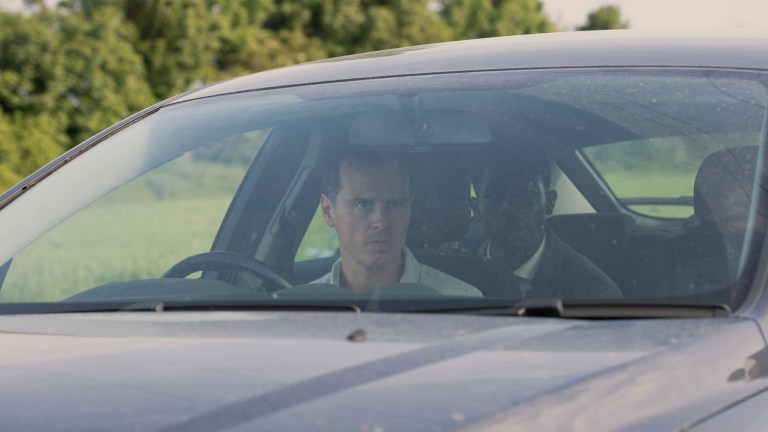Black Mirror Season 5 Episode 2 Review: Smithereens
The ills of social media are on full display in Black Mirror season 5's second episode.

This review contains spoilers for Black Mirror season 5.
Black Mirror Season 5 Episode 2
When real life caught up to Black Mirror, series creator Charlie Brooker promised us he’d look ahead. After moving over to Netflix for the series’ third season, he delivered reality-altering leaps in episodes like “San Junipero,” and “Playtest,” and season four’s “USS Callister.” Then he spent a year dismantling the medium as we know it and rebuilding it in the mold of the video game. Bandersnatch, Netflix’s first “interactive” film, nearly broke my brain when I tried in earnest to review it. I don’t know if this trajectory set expectations any higher for Black Mirror season 5, but we could reasonably infer, based on the show’s track record, that the new episodes would introduce concepts designed to send us spiraling through bad dreams about tomorrow’s tech.
Though not solely limited to the technology itself, Black Mirror fans have been conditioned to look for narrative twists. It’s Charlie Brooker’s best magic trick, one he uses to deploy themes and ideas that fit the wider scope of the Black Mirror universe. You can feel the threat of it beating like a pulse throughout “Smithereens.” Only here, Brooker pulls the rug on us to tell a human story refreshingly relevant to our current era. The episode’s only crime–other than stalking, kidnapping, and extortion–is its story is too self-contained to fully realize the potential of the ideas it starts to unpack.
There’s ample suspense and tension to mine in the story of a kidnapping gone sour. The episode opens with Chris (Fleabag’s Andrew Scott) meditating in his car while he waits for a rideshare app to land him a customer. He’s fidgety, on-edge. Director James Hawes, who directed the season 3 episode “Hated in the Nation,” deliberately shot Chris’ reactions to the use of phones in a cafe to cast a shadow of isolation around him. Every shot from there on out begins to feel like either flashback (quick cuts to a dark road), foreshadowing, or purposeful misdirection.
The clues about Chris’ life and motivation start to pour in after the title card. He attends a grief counseling meeting and finds momentary physical comfort from a woman whose college-aged daughter committed suicide. She confides that she is trying to access “Persona,” a type of social network, to piece together what drove her daughter to take her own life. It barely registers with Chris, who’s mostly despondent. The next day he’s back in his car outside the same office building. Chris picks a man in a suit named Jaden (Damson Idris) and promptly attempts to kidnap him. Chris is bad at kidnapping; a series of fuckups leads to him holding Jaden, a sharply dressed intern, hostage at gunpoint during a standoff with police in an open field.
Much of the next 40 minutes is dedicated to Chris and Jaden jostling around in the car while the outside world handles the bulk of the character development. During this time we learn that Smithereen is a social network where, surprise, dog pictures are popular, and that nearly half the world’s population is on it. This means the company braintrust has access to Big Data. In minutes they uncover more information on Chris than the police could gather in a week. Though it’s played for laughs in an effective way, it feels like a major sidestep for Black Mirror to only lightly probe what is essentially a stand-in for Facebook when serious concerns about user privacy, social media’s role in our democracy, and lack of oversight are headline news. When Smithereen tracks Chris in real time and relays that information to the authorities, it opens up an important moral and legal discussion that unfortunately the episode doesn’t have time for.
The driving force of the episode is vulnerability in the digital age. A gross invasion of privacy is laughed off and accepted as the cost of doing business; by entering phone numbers and emails during sign-up, people are agreeing to let social media companies track their every move. Lives are just data points – which is illustrated by the post-credits scenes. On a more personal level, Chris lashes out at Jaden for not looking up from his phone, making it easier to drive off-route and kidnap him; rating systems and slick-designed apps are an imperfect defense system against potentially dangerous individuals as a recent rideshare-related tragedy showed us. We’re also easily susceptible to social media that is purposely designed to give us tiny hits of dopamine. And that we eventually find out is the entire reason why Chris pulled this whole charade: to confront Billy Bauer, the founder of Smithereen, about the ills of his product.
Throughout the episode we see people buried in their phones. The teenage bystanders are broadcasting the hostage situation on social media. The Smithereen braintrust pushes algorithm-based hostage negotiation talking points on Billy Bauer. It all feels inauthentic until Billy Bauer (Topher Grace nails the character, by the way) connects with Chris in a real way. We finally get the reveal the episode was building towards; Chris admits he was at fault for his fiancé’s death on account of distracted driving. A momentary laspe in judgement, a quick peek at Smithereen on his phone, cost three lives. Billy admits Smithereen isn’t entirely innocent because of the addictive nature of the app. Scott’s performance as Chris is unnerving throughout, but he dials it up to a 10 as he labors through an explaination of his unspeakable pain, keeping Billy, Jaden, and the audience hanging on every word. Chris doesn’t scapegoat Smithereen as we’re led to believe. On what he says is his final day, Chris wanted to speak his truth, hoping it could be a change agent. Ultimately, Brooker writes human stories that spark from a curiosity about innovative technology. He claims they’re not warnings, but it’s hard not to see Chris’ story as one when these avoidable accidents claim lives every day.
“Smithereens” is riveting television–granted it’s hard to make a boring hostage situation– that doesn’t fully escape from under the weight of its own ambition. There’s an internal discussion going on in my head about the episode I wanted to see made–a deeper dissection of social media’s impact on society–versus the one that was made–a human story about coping with loss and rectifying our addictive relationship to technology. In the end I was satisfied that it touched on elements of both. The episode struggles to develop Chris beyond his manic moments despite having every opportunity bounce exposition off Jaden in the car. It loses some emotional gravity by trying so hard to maintain the suspense of the series’ signature twists, and in the process it missed key chances to add depth to its protagonist.
Even still, the big reveal–the cause of Chris’ anguish–was devastating. It’s grounded material that doesn’t need to be viewed through the lens of speculative fiction. It’s real, it’s important, and if watching this episode saves a life – there’s no star rating or critical review in the world that could do it justice. It’s a sobering reminder that we should be looking ahead, away from our screens, more often.
